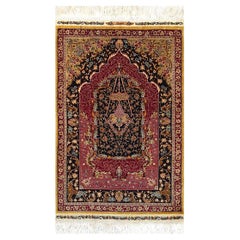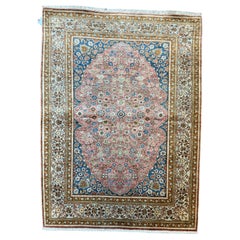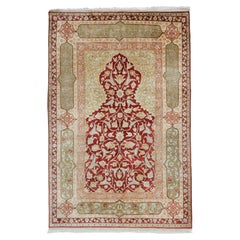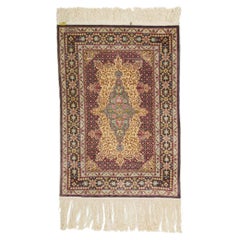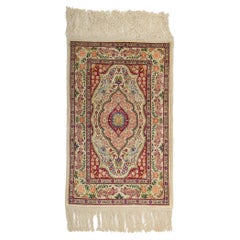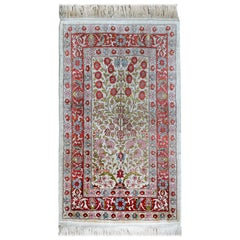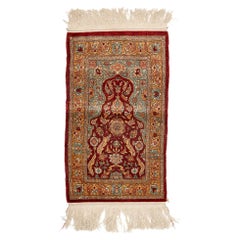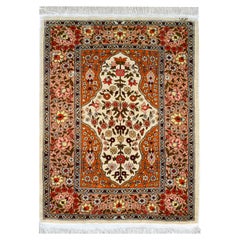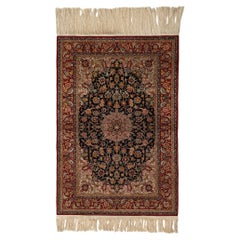Silk Hereke Turkish Rugs
Vintage 1940s Turkish Tribal Turkish Rugs
Silk
Late 20th Century Turkish Turkish Rugs
Silk
20th Century Turkish Turkish Rugs
Silk
Late 20th Century Turkish Louis XIV Turkish Rugs
Silk
Late 20th Century Turkish Art Nouveau Turkish Rugs
Silk
Late 20th Century Turkish Turkish Rugs
Silk
Late 20th Century Turkish Islamic Turkish Rugs
Silk
Late 20th Century Turkish Tribal Turkish Rugs
Silk
Early 20th Century Turkish Turkish Rugs
Silk
20th Century Turkish Turkish Rugs
Silk
20th Century Turkish Turkish Rugs
Silk
21st Century and Contemporary Turkish Turkish Rugs
Silk
20th Century Turkish Turkish Rugs
Silk
Late 20th Century Turkish Tabriz Turkish Rugs
Silk
Late 20th Century Turkish Other Turkish Rugs
Metal
20th Century Turkish Turkish Rugs
Silk
20th Century Turkish Turkish Rugs
Silk
20th Century Turkish Islamic Turkish Rugs
Silk
20th Century Turkish Turkish Rugs
Silk
Vintage 1950s Turkish Tabriz Turkish Rugs
Silk
Late 20th Century Turkish Tabriz Turkish Rugs
Silk
20th Century Turkish Turkish Rugs
Silk
20th Century Turkish Turkish Rugs
Silk
Mid-20th Century Turkish Other Turkish Rugs
Metal
Early 20th Century Turkish Turkish Rugs
Silk
20th Century Turkish Turkish Rugs
Silk
Late 20th Century Turkish Other Turkish Rugs
Silk
20th Century Turkish Turkish Rugs
Silk
20th Century Turkish Turkish Rugs
Silk
20th Century Turkish Turkish Rugs
Silk
Mid-20th Century Turkish Turkish Rugs
Silk, Wool
Late 20th Century Turkish Turkish Rugs
Silk
20th Century Turkish Turkish Rugs
Silk
Vintage 1940s Turkish Kilim Turkish Rugs
Wool, Silk
Antique Late 19th Century Turkish Turkish Rugs
Wool
Vintage 1970s Turkish Turkish Rugs
Silk
Vintage 1960s Turkish Turkish Rugs
Silk
21st Century and Contemporary Turkish Other Turkish Rugs
Silk
Vintage 1980s Turkish Rugs
Silk
Vintage 1980s Turkish Rugs
Silk
21st Century and Contemporary Turkish Other Turkish Rugs
Metal
20th Century Turkish Mid-Century Modern Turkish Rugs
Silk
20th Century Turkish Turkish Rugs
Silk
Antique 1870s Turkish Turkish Rugs
Silk
2010s Turkish Other Turkish Rugs
Silk
Vintage 1980s Turkish Oushak Turkish Rugs
Organic Material, Silk
Late 20th Century Turkish Tabriz Turkish Rugs
Metallic Thread
Mid-20th Century Turkish Victorian Turkish Rugs
Silk
Mid-20th Century Turkish Other Turkish Rugs
Silk
Late 20th Century Turkish Art Nouveau Turkish Rugs
Silk
Late 20th Century Turkish Tabriz Turkish Rugs
Metallic Thread
Late 20th Century Turkish Tabriz Turkish Rugs
Metallic Thread
Late 20th Century Turkish Tabriz Turkish Rugs
Metallic Thread
Early 20th Century Turkish Turkish Rugs
Wool, Silk, Cotton
Vintage 1970s Turkish Turkish Rugs
Silk
21st Century and Contemporary Turkish Other Turkish Rugs
Silk
Vintage 1970s Persian Turkish Rugs
Silk
Vintage 1920s Turkish Turkish Rugs
Silk
Late 20th Century Turkish Baroque Turkish Rugs
Silk
Late 20th Century Turkish Turkish Rugs
Silk
- 1
Silk Hereke Turkish Rugs For Sale on 1stDibs
How Much are Silk Hereke Turkish Rugs?
Finding the Right Turkish-rugs for You
Antique and vintage Turkish rugs, with their ruby reds and misted blues, their entwined botanical designs and rhythmic geometries, are as beloved today as they were in the 13th century, when the Turks of the Seljuk Empire began weaving these vibrant carpets in Anatolia.
A Turkish rug is simply one made in Turkey or the former Ottoman empire, employing the region’s unique traditional methods and weaves. Varieties range from flat-woven kilims to lush knotted rugs, known as hali, many of which are created with Ghiordes, or Turkish, knots. Whereas in other knots, the weft (crosswise) yarn is wrapped around one warp (lengthwise) yarn, in Ghiordes knots, it is wrapped around two, imparting lushness and durability. In addition to knotting techniques, Turkish rugs differ in their motifs — naturalistic or stylized, geometric or figurative — which often reflect the region where they were made.
The main types of Turkish rugs, as Milan-based carpet dealer Alfredo Levi explains it, are kilim, typified by a plain slit-tapestry weave, which leaves a gap, or slit, between sections woven with different yarns in different colors; sumak, made with weft wrapping, for a sturdier flat-woven carpet; and cicim, which he describes as “a type of sumak with extra brocade techniques typical of the tribes and villages of central Anatolia.
Within each type, there are various regional styles. Among these are Bergama carpets, characterized by bright reds and strong medallions; thick-piled Tulu rugs; and Konya rugs, which Marco Polo is said to have called “the most beautiful in the world.” With their strong tribal motifs and hot-red wefts of especially luxurious wool, Konya carpets are especially prized by collectors.
Also treasured are Oushak (or Ushak) rugs, with their complex, intricate designs and warm earth tones of saffron, cinnamon, blue, ivory and gold; and Hereke carpets, originally created exclusively for Ottoman sultans, using the finest silk. For Jason Nazmiyal, of New York carpet dealer Nazmiyal Antique Rugs, “a good Turkish rug is when the colors are harmonious.” This is true of both modern and antique Turkish rugs, but the hues have changed over the centuries, thanks to both technology and changes in culture and taste.
Patterns, too, have evolved. Although many weavers continue to produce traditional designs, others reinterpret their cultural heritage in contemporary terms, with bolder ornamentation and more geometric motifs. Contemporary Turkish rugs also are seldom made by hand and often incorporate synthetics into the weave, for cost-effectiveness and a durability suited to 21st-century life.
Find antique and vintage Turkish rugs for your home on 1stDibs. At The Study, read about how to take care of your antique or vintage rug as well as how to choose the right rug for your space.
- Are Hereke rugs valuable?1 Answer1stDibs ExpertApril 5, 2022Yes, authentic Hereke rugs are considered very valuable. Hereke rugs are coveted for their intricate, beautiful designs and high-quality silk-blend fabrication. Hereke rugs and carpets are handmade in Turkey and are often associated with royalty. Shop a wide selection of Hereke rugs on 1stDibs.
- 1stDibs ExpertApril 5, 2022There are a number of ways to determine if a Hereke rug is real or fake. Fortunately, most Hereke rugs are signed, usually featuring abstract arabesque patterns and composed of expensive natural silk. Shop a collection of authentic Hereke rugs from some of the world’s top boutiques on 1stDibs.
- Where are hereke rugs made?1 Answer1stDibs ExpertApril 5, 2022Hereke is a town in the Kocaeli province in Turkey, and it is where these attractive and desirable rugs are produced. At least, this is where they were originally produced. Today, they may be manufactured in other cities using the traditional Hereke methods and fine silk threads. Shop a collection of properly vetted vintage Hereke rugs from some of the world’s top sellers on 1stDibs.
Read More
Hechizoo’s Original Sin Rug Tempts with Shimmering Copper, Tin and Bronze
Embroidered with snakes, turtles, birds and vines, it celebrates a dazzling natural world before the arrival of Adam and Eve.
Splashy Blooms Bud and Wilt in Artist Santi Moix’s Floral Rug
The colorful design captures the natural splendor of a backyard garden.
In South Africa, Rich Mnisi Is Taking Biomorphic Design to the Next Level
The rising fashion star is having his first solo show of furniture designs, at Southern Guild in Cape Town, and his far-out, snaking forms are like nothing you've ever seen.
The Artists and Designers behind Today’s Coolest Rug Collaborations
Top carpet companies are expanding the arena of artful floor coverings, seeking out creatives from other media and marrying their talents to textiles.
Tantuvi’s New Rugs Were Inspired by the Travertine Quarries of India and the Spanish Steps of Rome
The New York–based rug designers employ earthy colors and time-honored artistry in their creations.
We’re Going Gaga for the New Sasha Bikoff Rugs
The New York interior designer found inspiration in disco culture and astrology for her debut home collection.
Paradise Is Found Underfoot in These Majestic Persian Textiles
Persian garden carpets, with their timeless beauty and unmatched craftsmanship, have an enduring appeal.
12 Mesmerizing Moroccan-Style Interiors
With their rich layers, intricate patterns and elaborate lighting, rooms with a Moroccan influence are easy to spot.
